Warning: Graphic (i.e. bloody) photo ahead!
Last week, I wrote about a wonderful product called Road ID. Road ID was created on the concept that active people should wear ID as part of their gear when participating in outdoor activities. Road ID comes in many comfortable and visually-appealing styles, like bracelets, shoe tags, and dog tags.
I have the dog tag Road ID and positively LOVE it. The scary truth is that there are many, many bad things that can happen to me while I am on a run. I don’t want to live in fear, but I also don’t want to be unprepared in case of an emergency.
Lindsay’s Story — A Real-Life Reason to Wear Your ID
Lindsay is a young, beautiful, and active woman who loves to bike, run, and swim. She is even part of a local triathlon team!
In November, Lindsay was on a normal group bike ride with her coach and fellow triathletes. Around mile 13, the bike ride suddenly took a very serious and scary turn. Lindsay was headed down a hill at 25 miles per hour when she either hit something in the road or braked too hard and fast. She flew headfirst over the handlebars, skidding several feet across the asphalt…. on her face.
She vaguely remembers gasping for air, spitting blood, and being loaded into an ambulance. Slipping in and out of consciousness, she was wheeled into the ER with a broken jaw and several shattered teeth.
Lindsay was surprised to discover that the nurses and doctors would not treat her without proof of insurance. None of her friends who accompanied her to the hospital knew this information, and although they managed to contact her mother via cell phone, her mom also didn’t have the information on hand.
Lindsay says, "I was completely shocked that I was not able to remember something as simple as my address. I was spouting off numbers from my previous addresses, but kept saying “no, that’s not it”, as the nurses grew increasingly annoyed. I had recently moved, so my friends were unaware of my new address. "
As a result, Lindsay had to wait 20 minutes (in excruciating pain without any medication) before her insurance information was located.
Her jaw was wired shut for 5 weeks, after which the wires were replaced by rubber bands until January. She lost twenty five pounds off of her already fit frame! She is still in the process of having her teeth reconstructed. When all is said and done, Lindsay will have 2 root canals, 3 full crowns, 2 partial crowns, 1 implant, and 8 veneers, as well as a metal plate in her chin.
Since the accident, Lindsay has realized how important it is to carry ID and is a huge supporter of Road ID. Also, Lindsay advises cyclists to invest in a quality safety equipment, as her helmet and sunglasses saved her life.
"Wear your helmet (CORRECTLY), glasses, and an ID EVERYTIME you are on your bike," she warns. "If I wouldn’t have had my sunglasses on, or had a cheap pair that broke, I would have lost my right eye. If I didn’t have my helmet on, which broke, I probably wouldn’t be alive, or would have severe brain damage."
Happily, Lindsay is back in the saddle and facing her fears. "I have been back on the bike a few times now since the crash, though I’m slower now than I was due to being overly precautious," she says. She even plans to compete in an upcoming Ironman Triathlon!
Why Should You WEAR Your ID?
Here are several reasons why should you WEAR your ID in the form of a Road ID.
- Keeping your ID in your pocket is better than nothing; however, in a serious accident, it is unlikely your clothes will stay in 1 piece or even make it to the hospital with you. The majority of the time, clothing are cut off by paramedics and other first responders, and an ID in your pocket may get lost in the shuffle.
- Relying on your cell phone to hold your emergency contact information is not smart — phones may be smashed during the accident.
- Furthermore, for their own protection, paramedics and other medical professionals will not search bike bags, fanny packs, helmets, wallets, and purses for identification. Personal belongings are left for the police to record in their report of the accident.
- Your parents, spouse, or friends probably do NOT know your emergency contact information by heart. Additionally, these people probably know very little about your medical history, medications, allergies, and insurance information.
- The HIPPA Laws and Patient Privacy Act make it very difficult to track down family members or friends who have been admitted to the hospital. Hospitals will usually refuse to release any information unless the patient has signed various medical documents.
How You Can Keep Yourself Safe
- As Lindsay described, always wear safety gear, which includes your ID and insurance information.
- Purchase a Road ID and list your parents, spouse, or roommate as the emergency contact.
- Make sure your emergency contact person has a copy of your health insurance information in their wallet. Make sure you give them updated cards each year.
- Always wear your Road ID when your are exercising outside, whether alone or in a group.
- Discuss your preferences about medical treatment (i.e. life support and organ donor options) with your close family.
WIN a FREE Road ID!
I believe Road ID is a fabulous product that each and everyone of you should have. Road ID has generously offered to donate IDs to TWO lucky readers! You can choose any style you’d like (I LOVE my dog tag!).
To enter, simply leave a comment below. I will randomly select the winners Friday at 8:00 AM EST. Please only comment once. If you choose to comment using the Name/URL option, please include your e-mail address so I can contact you if you are the winner!
To receive a double entry, link back to this post on your own blog and send me an email at seebriderun@gmail.com with a link to your post.

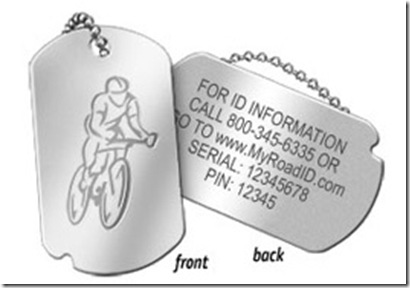
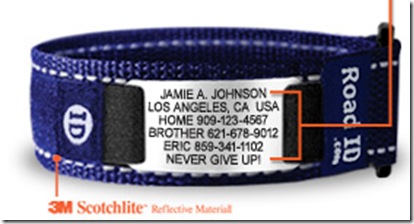

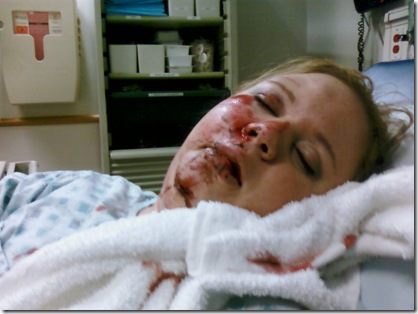
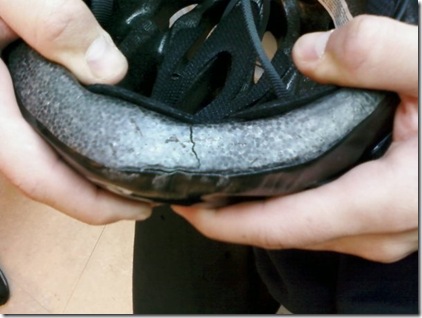
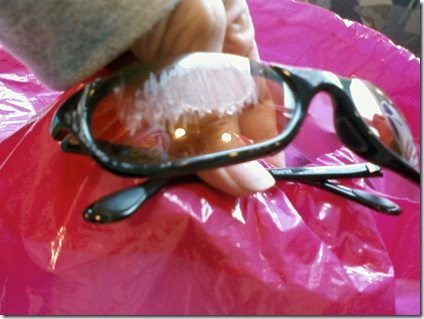
What an amazing story! These IDs are such a good idea because you never know what will happen.